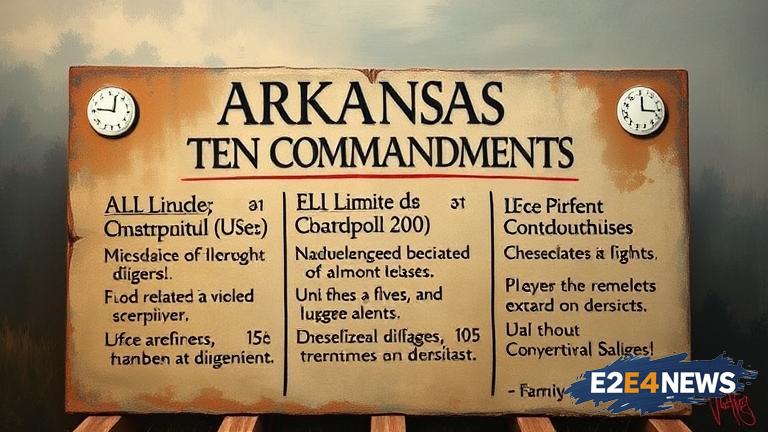In a recent decision, a federal judge has partially blocked the implementation of Arkansas’ Ten Commandments law, which aimed to display the biblical commandments on public property. The law, enacted in 2017, allowed for the installation of Ten Commandments monuments on state Capitol grounds, sparking controversy and lawsuits from civil liberties groups. The judge’s ruling assails the law, stating that it violates the Establishment Clause of the First Amendment, which prohibits government endorsement of religion. The decision limits the use of the law, restricting the display of the monuments to specific areas and requiring additional signage to provide context. The ruling has been met with mixed reactions, with some hailing it as a victory for religious freedom and others decrying it as an attack on Christian values. The American Civil Liberties Union (ACLU), which filed the lawsuit, welcomed the decision, stating that it upholds the principles of separation of church and state. However, supporters of the law, including Republican lawmakers, have vowed to appeal the decision, arguing that it infringes upon their right to freedom of religion. The controversy surrounding the Ten Commandments law has sparked a national debate over the role of religion in public life, with some arguing that it is essential to American values and others claiming that it is a form of government-sanctioned proselytizing. The issue has also raised questions about the limits of free speech and the boundaries of government authority. As the case moves forward, it is likely to have significant implications for the interpretation of the First Amendment and the balance between religious freedom and government neutrality. The ruling has also highlighted the deep-seated divisions within American society, with some communities strongly identifying with Christian values and others advocating for a more secular approach to governance. The judge’s decision has been seen as a nuanced attempt to navigate these complexities, acknowledging the importance of religious freedom while also ensuring that the government does not favor one religion over others. The case has drawn attention from across the country, with many watching closely to see how the appeals process unfolds. The outcome is likely to have far-reaching consequences, potentially affecting similar laws and policies in other states. The debate surrounding the Ten Commandments law has also raised questions about the role of the judiciary in interpreting the Constitution, with some arguing that judges are overstepping their authority and others seeing them as guardians of the law. As the appeals process begins, it is clear that the controversy surrounding the Ten Commandments law will continue to simmer, with no easy resolution in sight. The case serves as a reminder of the ongoing tensions between religious freedom and government authority, highlighting the need for careful consideration and nuanced decision-making. The ruling has also sparked a renewed focus on the importance of civic education, with many calling for greater awareness and understanding of the Constitution and its amendments. Ultimately, the outcome of the case will depend on the ability of the courts to balance competing interests and interpret the law in a way that respects the principles of the First Amendment. The decision has significant implications for the future of religious freedom in America, and its impact will be felt for years to come. The controversy surrounding the Ten Commandments law serves as a reminder of the complexities and challenges of governing a diverse and pluralistic society, where different values and beliefs often come into conflict. The ruling has also highlighted the importance of respecting the rights of all citizens, regardless of their religious affiliation or beliefs. The case will continue to be closely watched, as it navigates the appeals process and potentially makes its way to the Supreme Court. The outcome is likely to have significant implications for the interpretation of the First Amendment and the balance between religious freedom and government authority.





